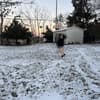World Cultures and History Midterm Study Guide PDF
Document Details

Uploaded by LionheartedLight34
Tags
Summary
This study guide provides an overview of the topics covered in the midterm exam for World Cultures and History. It covers various aspects of early human history, archaeology, anthropology, and the development of hominids and early civilizations. It emphasizes the importance of using primary sources to study the past, and discourage the use of search engines.
Full Transcript
WorldCulturesandHistoryMidtermStudyGuide Thesearethetopicsfromeachchapterthatwillbeonthemidterm.Useyour notes,thebook,andeventuallymymaterial…donotuseGoogle. Chapter1:TheRiseofCivilizations(AdditionalStudyAid:Jeo...
WorldCulturesandHistoryMidtermStudyGuide Thesearethetopicsfromeachchapterthatwillbeonthemidterm.Useyour notes,thebook,andeventuallymymaterial…donotuseGoogle. Chapter1:TheRiseofCivilizations(AdditionalStudyAid:Jeopardy) Prehistory/EarlyDevelopment:Historiansusedwrittenrecordsanddocumentstodepict thepast.Todeterminetheagesofartifactsandfossils,theyusedradiocarbondating, thermoluminescence,microscopic,andbiologicalanalysesoftheremains.Scientists thatstudyprehistorictimesmustuseevidencetolearnaboutearlyhumans. Archaeology:Studytheearlysocietiesbyanalyzingartifactsthatpeopleleftbehind suchastools,weapons,andart.Bylookingatartifactslikepottery,tools,andweapons, scientistslearnaboutthesocialandmilitarystructuresofsociety.Bylookingatskinand bones,thedietsandactivitiesofearlypeoplecanbediscovered. Anthropology:Anthropologistsstudyhumanlifeandculturesbyusingartifactsand fossilstocreateanimageofwhatanaveragepersonslifeissupposedtolooklike. (Archaelogy:Studyofthepast,Anthropology:Studyofthepresent) TypesofHominids: MaryandLouisLeakeyspentmajorityoftheirlivesresearchingabouthominids.One day,alltheirhardworkpaidoffwhentheydiscoveredahominidinEastAfrica.Atthat time,thehominidshehadjustdiscovered,wascloseto1.8millionyearsold. -EarlyHominids:Human-likecreaturesthatwalkedupright.Theearliesthominidswere datedbacktolivearound4millionyearsago. -HomoHabilis:Amoreadvancedhominidwithalargerbrainthanitsancestors.Homo habilismeans“handyhuman”anditissaidthattheymightveusedstonetools.Another hominid,Homoerectuswassaidtohaveemerged1.5millionyearsago.These hominidswalkeduprighton2legsandhadbotharmsandlegsmostidenticaltothe proportionandbuildofamodernhuman.Homoerectus’areprobablythefirsthominids toeverstepoutofAfrica. -Homosapiens:Cametoexistabout250,000yearsagoandsuccessfullyachievedfire alsohavingtheadvantageofbraingrowth.Werecalled“wisehuman” -Homosapienssapiens:Meaning“wisewisehuman”.Cametoexist200,000yearsago andspreadacrosstheworldreplacingNeanderthals.Thespreadallacrossandoutof Africa,increasingitspopulationinAsiaandEurope.Theyeventuallycameacrossthe Neanderthals,eventuallyreplacingthemandalsohavingtheneanderthalstodieout. Homosapienstraveledpracticallyalloftheworldinsearchoffoodandhunting grounds.Inawholegeneration,theyonlytraveledabout2-3miles. ImportanceofStonetools:Stonetoolsmadeearlyhumanssustainthemselves.To makethesestonetools,earlypeopleusuallyusedflint.Overtime,thePaleolithicpeople advancedtobettertoolsandweapons.Theinventionofthebowandarrowincreased theaccuracyofhunting ImportanceofFire:Firewasamajordiscoverythatprovidedwarmth,protection,and alsogavethemtheabilitytocookandroasttheirfood.Evidenceofashesincaves provedthattheyusedfirebackthen500,000yearsago.SitesinnorthernChinawere foundtohavehearths,ashes,charcoal,andcharredbones.Cookingtheirfoodreally seemedtoimprovethenutrition. SystematicAgriculture:Thetransitionofhuntingdownanimalsandgatheringfoodto thekeepingofanimalsandthefarmingondailybasis.Byfindingplants,theynowhada reliablefoodsourceandtheydidnthavetotravelmilesandmilesinsearchoffood. Farmingandtaminganimalsbecameahugeagriculturalrevolution.Around8000-5000 B.C.,agriculturespreadedanddevelopedinmultiplepartsoftheworld,originatingin SouthwestAsia. NeolithicRevolution:Theperiodwhenagriculturewasbeginningtobeintroduced; peoplebegantogrowcropsdailyandkeepanimalsinsteadofhuntingthem immediately.Stillhuntingandgatheringwerestillaroutineforsomepeopleasthey prefereditoversettlingtofarm.By4000B.C,farminghadbeenknownandusefulin centralEuropeandregionsoftheMediterraneansea. Labor:Becauseofagriculture,manypeoplehadbecomefarmers,makingpeople availabletoworkotherroleslikeartisanswhomadeothergoodsandtradedthem. Useofmetal:Metalsmadetheirtoolsandweaponsstrongerandalsogavethepeoplea differentlevelofcontrolovertheenvironment. 6characteristicsofacivilization: -Cities:Theirhugeandcontinuousfoodsupplysupportedandprovidedforthecityas thepopulationandthecitygrew. -Government:Thegovernmentmaintainedandcontrolledthefoodsupplyandtheneed fordefenses.Thefirstcivilizationswereusuallyledbyamonarch. -Socialstructure:Theirsocialstructurewasbasedoneconomicpowerwhichincluded bothupperclasspeopleandtheslaveclass. -Religion:Peoplesooncameupwithreligionstogivethempurposesontheirroleon earthandexplaintheforcesofnature.Theyalsocameupwithritualsthatbelieved wouldpleasetheirgodsinreturnofgoodfortuneandhighamountsoffood. -Writing:Rulers,priests,merchants,andartisansallusedwritingforrecordkeeping. Writingwasalsosometimeswasusedincreativeexpressions. -Art:Architects,painters,andsculptorsexpressedthemselvesthroughart. TheFertileCrescent:Itwasthefirstcreationof1stmesopotamiancivilizations. MesopotamiawasbetweentheTigrisandEuphratesriver.Thefertilecrescenthad annualflooding,fertilesoil,andabundantcrops. -AncientMesopotamiaandSumerians:Societyhadpolytheisticbeliefs,atheocratic government,andalsotookpartheavilyonfarming,trading,andindustry. Chapter2:TheSpreadofCivilizations(AdditionalStudyAid:Jeopardy) AncientEgypt:Geography NileRiver:Gaveanaturalroutefortransportationandcommunication.Farmersneeded thefloodingfromtheNiletowaterthesoilthatgrewtheircrops.TheNilealsoprotected themfrominvasionsbecausetheywereseenandgavethemnaturalbarriers. Religion:Polythestic,Religousideaswereknowntobeaverymajorpartinworldorder. AccomplishmentsoftheAncientEgyptians:Architectureandsculptureslikepyramids, temples,andformulaticsculptures.Mathematics,geometry,andthe365daycalender. Hieroglyphicsandhieraticwritingforms:Hieropglyphicsweremadeupofpicturesand graphicformsthatwerewrittenontemplesandtombs.Hieraticscriptswerewritten mostlyonpapyrusandwasusedforbusinessandgeneralneeds. PhoeniciansAlphabet:Theysimplifidedtheiralphabetto22signsusedtorepresent theirsoundofspeech.Lateron,theGreekswereinspiredbythemtoalsomakeanother setofalphabetsmadeoutofsigns.TodayweusethealphabetmadebytheRomans. TheIsraelites,Judaism Religionanditsdifferencefrompreviousones:Judasimwasthefirstreligionthatonly worshippedonegodandnotmultiple.Thejewsbelievedthateveryoneelsewhowas notgodwerehisserventsandtheyalsothoughtthatgodpunishesthosewhoarenot good.Becausetheybelievedinonegod,itseperatedthemfromthepeoplethat believedinmultiple. Influence:JudaismlaterinfluencedChristianityandIslam. IndusValleyCivilization:Hadhundredsofsettlements,urbanplanning,water,and sanitation(bathrooms/drainagesystems/chutes).Rulerscombined/connectedreligion androyaltytogethermakingpoliticalpowerandreligionveryalike.Theeconomy dependedonfarming,trading,andtextiles. India’sClimateandgeography:TheHimalayanMountains,GangesandIndusriver valley,DeccanPlateau,Coastalplains,andMonsoons.Monsoonswereextremely importanttotheIndiabecauseifthemonsoondidnotcome,thenthecropswouldnot growanddie,causingitspeopletostarve.TheWestcoastofIndiadependonthe monsoonsthemost. RiseofAncientChina:Shangsocietyincludedmerchants,artisans,andslaves.The chinesebelievedinsupernaturalforcesandtheybelievedthattheseforcesassisttheir rulersintheiraffairs.Tocommunicatewithgods,theymadeoraclebones.Chinese believedinlifeafterdeathandgoodandbadfortunatethattheirdeadancestorswould bringtothembasedonhowgoodtheytreatedthem.TheShangismostlyknownfor theirbronzecasting.Manybronzeitemswerefoundintheirtombs.TheZhoudynasty dislikedtheShangsotheyestablishedanewdynasty.TheZhoudynastyisthemost longestlastingdynastyinChinesehistory(Lasted800years).TheZhoudynastydid takeacoupleoftraditionsfromtheShang,likedividingtheterrirtrorieseachcontrolled byofficials.Officialswereappointedbythekingpersonally.TheZhoubelievedtohave ruleChinabecausetheyhadtheMandateofheaven.Thekingwasseenasalink betweenbothheavenandearth.Thekingwassaidtohavebeencommandedtobe king/linkofbothworlds,byheaven.Thezhoukingsjobwastokeepthegodssatifiedso thatthegodsmayprotectthepeoplefromnaturaldiaster.Ifthekingwasunabletodo this,heusuallywouldbereplaced. GeographyandClimateimpact:Archaelogistsmanagedtofindmultiplehugebuildings madeinShangChina.Shangkingshad5differentcapitalcitiesbeforeetsbalishing Anyang.ValleysalongtheHuangHeandChangJiangwerethemostbiggestand popularfood-producingareaoftheworld.Mountainsanddesertsisolatedthechinese frompeopleinotherpartsofAsia.TheclimateinChinadependedonelevationsand monsoons.Dryorwetseasonsmadethetemperaturedifferentforwintersand summers. Chapter3:AncientGreece GeographyandClimateofGreece:Greececonsistedofmanymountains,seas,and islands.Thisnaturallybroughtthemisolationfromothercommunities.Greecewas smallercomparedtoMesopotamiaandEgypthadacoastlinethatstretchedoutfrom about8,500miles. CharacteristicsoftheDarkAgesinAncientGreece:WhentheMycenaeanscollapsed, populationandfoodproductionbegantofail.Duringthistime,somegreekssentgroups outtoAegeanandIonia.Irontoolswereabighelpinhelpingrepairthefoodshortage. GreeksthenadoptedthePhoenicianalphabet. CharacteristicsofSparta:Thespartansestablishedamilitarystatetolockinthecontrol overtheconqueredpeople.Spartanswerestrictlycontrolled.Spartansgovernmentwas anoligarchyruledby2kings.Ephorsassistedwithandhandlededucationfortheyoung citizens.Spartanspurposelyseparatedthemselvesfromanyoneandeveryonethat werepartoftheoutsideworld.TheyalsodidnotallowanyonetostepofSpartaand citizensweretaughttoonlystudytheartofwar. CharacteristicsofAthens: Mostpopularcitystateandhadahumongouslargeamount ofslaves.Athenswereruledbykingsforabitbutbythe7thcentury,theyhadswitched tobeingcontrolledbyaristocrats.Athensalsohadanavy,notamilitary.Dracobeganto establishharshpenalties,alsoincludingslaverytowhomeverwasindebt.Anaristrocrat namedSoloneventuallyendedlanddebtandfreedthepeoplethatwereslaved.When areformernamedCleisthenestookpowerin508B.C.,Theassemblywasthengranted accesstoestablishnewlawsafteropendebate. PersianWar:NumberoftroopsforPersiaandGreece: -Persia:180,000 -Greeks:7,000+300Spartans HowwasGreeceabletodefeatPersia?TheyjoinedtheirarmywiththeSpartans, puttingtheirdifferencesasideinordertoobtaintheirgoaloffightingandwinninga victoryagainstthePersians. AlexandertheGreatandtheHellenisticEra:AttackedthePerisanempire,obtaining AsiaMinor,Syria,Palestine,andEgypt.In331B.C.,Alexanderwonabattlenear BabylonandprettymuchsooncontrolledalmostallofthePersianempire.Alexander eventuallyledhisarmytoIndiabuthissoildershadnolongerwantedtogoanyfurther, andsoheagreedtoturnbackhome.Greeklanguage,architecture,literature,art,and religiousreachedtoAsiaandNorthAfrica.TheHellenisticculturewasacombinationof GreekcultureandEasterncultures.Alexanderdiedin323B.C.attheageof32. Whatphysicalbarrierrestrictedhisempire?:Alexander'sdeath HellenisticEmpirestrugglesafterthedeathofAlexander:Macedoniangenerals struggledforcontroloftheempire.Becauseofthis,workingtogetherorcomingtogether wasnotpossible.4Hellenistickingdomswerethenestablished:Egypt,Syria, Pergamum,andMacedonia.AlthoughAlexanderwishedforhisempiretobegoverned byPersians,Greeks,andMacedonians,themonarchsonlyreliedontheGreeksand Macedonianstoformtherulingclass. Chapter4:AncientRome(AncientRomeStudyGuide)(Cheatsheet) GeographyandclimateofAncientRome:RomehadItaly,whichwasapeninsula dividedbytheAppenineMountains.RomewaslocatedontheTiberRiver,hadaccess tothesea,andstillfaroutofreachfrompirates.TheLatinswereIndo-Europeanpeople whomovedintoItalybetween1500-1000B.C.Farmersandherderslivedinsettlements onRomeshills. Augustus,imperator:AlsoknownasCaesar,hewasappointedasdictatoranddeclined therequesttostepdown. HestartedacivilwarandafterdefeatingPompey,hewas announceddictatorforlife.Becauseofhisgrowingpowerandaccomplishments,a groupofsenatorsmurderedhim.TheythoughtthatthiswouldrestoretheRepublicbut insteadbroughtanothercivilwartoarise. FirstTriumvirate:Consistedof3men,Crarssus,Pompey,andCaesar.Theyallagreed tocombinetheircontrols,formingtheFirstTriumvirate.However,whenCrassuswas killedinbattle,agruingandfightingcameacrossPompeyandCaesar,causingthe SenatetocomeinconclusionthatonlyPompeyshouldrulebyhimself. FromRepublictoEmpire(Chronologicalevents) -FirstPunicWar:In264B.C.,RomeandCarthagestruggledforcontrolofthewestern Mediteranean.In241 B.C.,theyeventuallygaveuprightstoSicilybutvowedthatthey wouldtakerevenge.RomegrewbecauseoftheGreeksandEstrucans,theirgood leadership,theirpraticallaws/physics,andgeography. -TheFirstTriumvirate:Crassus,Pompey,andCaesaragreetotheveryfirsttriumvirate butafterCrassuspassesaway,itgoesdownhillandtheybegintofight.Caesarwonthe fightandwasnamedictatoroflife.Hethengetsassassinatedwhichmakesthesenate thinkthatitwillcausepeacebutitthenunleashesabrandnewcivilwar. -TheSecondTriumvirate:MadebyCaesarsheir,OctavianandCaesarsally,whichwas Antony,andLepidusbutOctavianandAntonysoonagreedtosplittheRomanworld betweenthebothofthem.Octavianintheendreceivedsupremepowerbecauseofhis victoryagainstAntony. -Octavianbecomingemperor:thiswasamarkforthenewRomanEmpire.Octavian becamethefirstRomanemperorandwiththewarsover,Hetookcontrolofaverybig army.HetookthenameAugustusandeventhoughheclaimedtohaverestoredthe republic,hetookmultipleformerprerogativesforhimself.